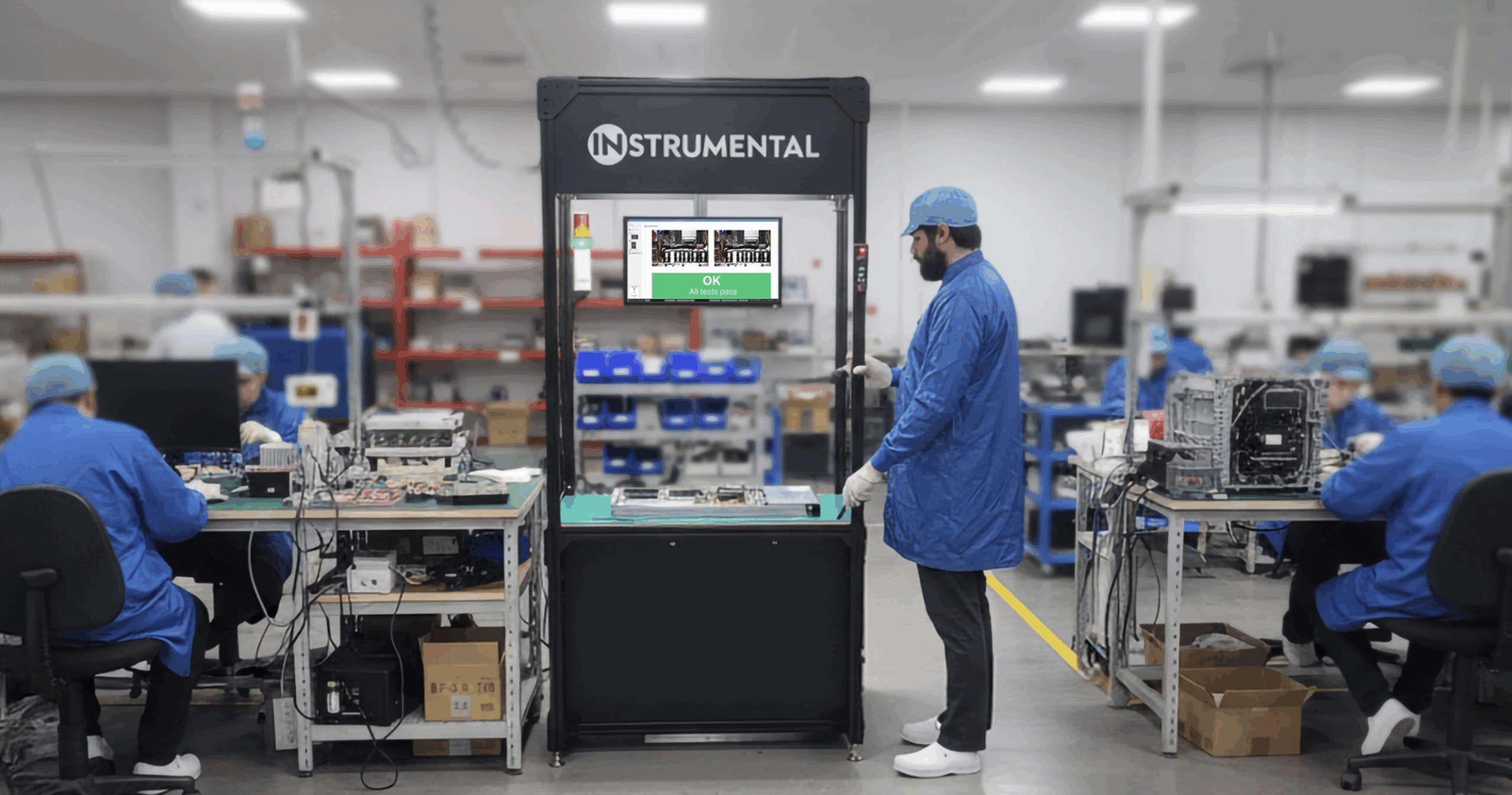Instrumental Inc. accelerates development of AI-powered manufacturing optimization platform to proactively find and fix design and process issues for electronics manufacturers
PALO ALTO, Jun. 30, 2020 – Instrumental Inc., creator of the manufacturing optimization software category, has secured $20 million in Series B financing to accelerate development of its manufacturing optimization platform. This first-of-its-kind solution enables hardware teams to accelerate time to market, reduce rework, derisk ramp, and increase yields by providing unprecedented real time remote visibility into assembly and product data.
The funding round was led by Canaan with participation from Eclipse Ventures, Root Ventures, Stanford StartX Fund, and First Round Capital.
“Instrumental’s goal is to close the loop between hardware design and engineering teams and what’s happening on the factory floor by giving teams a way to discover, analyze, and fix issues – from anywhere in the world,” says Anna-Katrina Shedletsky, Instrumental Inc. CEO and founder. “As a product design lead at Apple, a system like Instrumental would have saved me countless hours and saved the company many millions of dollars.”
Hrach Simonian, the Partner who led Canaan’s investment says, “At Canaan, we’ve had a long-standing thesis on machine vision and its application in many industries. Manufacturing is not as automated as people think it is, and this lack of automation results in a large amount of economic waste due to scrapping of defective products, product returns, and brand damage. As labor shortages and customer quality expectations grow, these problems aren’t going anywhere. Instrumental is on pace to dramatically change how manufacturing works, starting first with assembly line optimization, and Anna and Sam are uniquely qualified to solve it, drawing on their network, experience at Apple and deep appreciation for the challenges of product engineers.”
The $1 Trillion Cost of Reactive Manufacturing Optimization
Manufacturing represents half of the Gross World Product — over $48 trillion — but currently over $8 trillion of that is economic waste from mistakes or experiments, wasted time, scrap or rework, and product returns. Waste in electronics manufacturing alone is $1 trillion.
These issues are compounded by increasing complexity in the supply chain. Often, components are made and shipped from multiple locations around the world, and final assembly occurs far from the engineering and operations teams who are designing the product and process. For decades, if issues were discovered during new product development, ramp, or mass production, the solution has been to send teams on-site to analyze and solve problems in person. COVID-19 has paused global travel and consequently disrupted in-person factory visits, highlighting the risk and inefficiency of relying on flying a few key engineers around the world to find the problems that block product launches: anything from missing glue to complex process issues.
This type of issue discovery and resolution process was already too slow and error-prone for modern consumer electronics brands experiencing increasing pressures:
- Consumer expectations are higher than ever, and even a few defective units can decimate sales numbers. Losing just one star, down to four-stars on Amazon, can reduce sales by 50%.
- Hardware markets are more competitive than ever, with new entrants more than quadrupling in the last decade.
- In order to compete, innovation cycles are faster than ever before, meaning brands must make critical trade-offs between quality, cost, and time-to-market.
Unexpected issues during development can cause months of delay, add significant cost to R&D budgets, and introduce risk in the form of field liability, recalls and returns. In worst case scenarios, failing to catch issues before they happen can mean a full product recall or real injury to end users.
Existing solutions, such as Automated Optical Inspection (AOI) systems, or in-line functional testing, are only designed to check for issues you expect to be there. But new product introduction (NPI) is rife with problems that are not yet known. “As an engineer, if I knew what the problems were, I would fix them in the first place. Electronics manufacturing has been a reactive industry that depends on a lot of luck and heroics to make product launches happen,” said Shedletsky. “Our mission is to empower manufacturing teams to solve problems faster with the right data, at the right resolution, in front of the right people, in real time.”
Instrumental Inc. is Solving NPI & Mass Production Issues with Real-Time Data Visualization and AI
Instrumental Inc. is changing the way engineering and operations teams optimize their products during NPI, ramp and mass production by introducing the first cloud-based manufacturing optimization platform. Instrumental aggregates images from key states of assembly, uses AI and smart algorithms to uncover defects and issues, and contextually presents those issues in a traceable data record that can be accessed remotely.
Instrumental’s technology is able to unlock the full power of assembly data, so engineers spend less time sorting through data and more time focusing on solutions.
The result is faster product maturity, smoother ramps, higher yields, and less waste.
About Instrumental Inc.
Instrumental’s Manufacturing Optimization Platform accelerates time-to-market, improves yields, eliminates rework, and saves engineering time for hardware companies including Motorola Mobility, Axon, P2i, Meraki, and others.
Instrumental’s cloud-based software proactively identifies issues in real-time as they appear on the assembly line, and provides engineers and manufacturing teams with the complete data record they need to quickly discover new issues, complete failure analysis, communicate concisely with the factory team, and make process improvements in production. Instrumental’s proprietary AI closes the loop from issue discovery to failure analysis, root cause, and corrective action, enabling optimization from anywhere.
Instrumental was founded in 2015 by ex-Apple product engineers Anna-Katrina Shedletsky and Samuel Weiss.
About Canaan
Canaan is an early stage venture capital firm that invests in entrepreneurs with visionary ideas. With $5B under management, a diversified fund and hundreds of exits to date, we partner with entrepreneurs building the next generation of technology and healthcare companies that will transform how we live, work and thrive. To learn more about our people and our portfolio, please visit canaan.com
Related Topics



